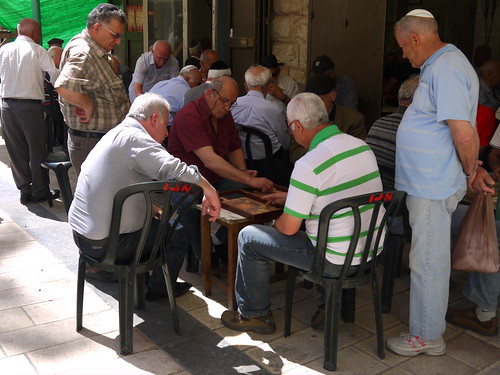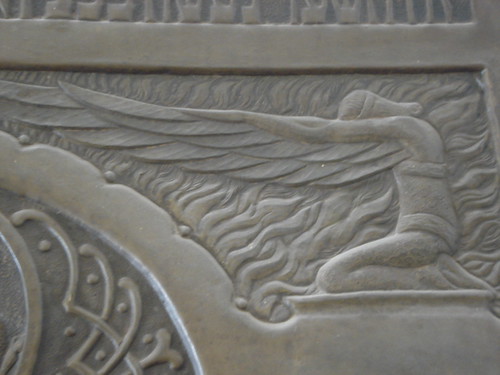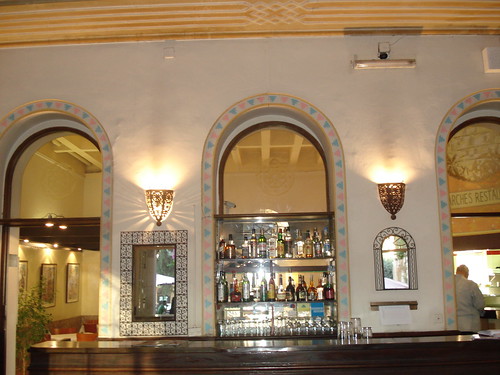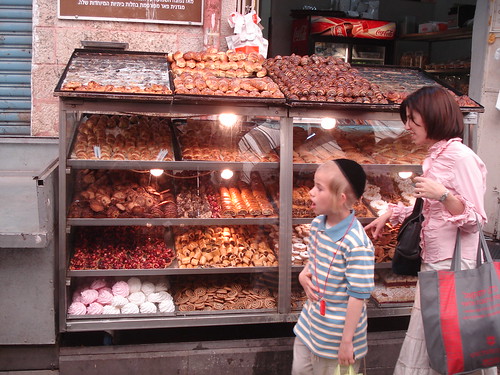Street scene near Mahane Yehuda Shuk
Visiting Jerusalem at Pesach is both interesting and frustrating. It is interesting because there is a particular mood here with Pesach and Easter falling at the same time, and the city is even busier than usual. It is frustrating because it's hard to tell whether places will be open or closed. That's because there are a range of interpretations of the Pesach holidays across different businesses. As other seasoned visitors to Israel will know, the only way to avoid frustration is to go with the flow, accept that you won't be able to get into some places and enjoy those that you can. And there will be plenty to see. Just walking the streets here is walking through history.
A note of caution. You won't read about major tourist sites in this post and you won't read about the political issues that plague the city, but you will read about some of my favourite places and a get a glimpse of the stories of some of the people who live and work in this wonderful city.
It is easy to eat well in Jerusalem and there are many excellent restaurants and cafes. I am a creature of habit and tend to stick to my tried and tested places, occasionally adding somewhere new to my list. These days I usually stay in the Harmony Hotel in Yoel Salomon street in the heart of downtown West Jerusalem. One of the attractions of this street is the wonderful cafe, Tmol Shilshom which is located up a flight of stairs in a courtyard and overlooks the busy Salomon Street below. Tmol Shilshom has an eclectic customer group, ranging from young Orthodox Jews out on dates, to tourists, writers and people who live or work in this part of the city.
The food at Tmol Shilshom is excellent. It works as both a cafe and a restaurant with hearty soups (I HAVE to have the sweet potato soup every time I visit Jerusalem), great pasta, salads, damn good cheese cake and other desserts. Tmol Shilshom is also a bookshop with the book shelves spread around the walls of the cafe, offering mainly second hand books in Hebrew and a smattering of European languages. There are regular literary events here, with book launches and poetry readings (usually but not always in Hebrew) as well as occasional musical evenings.
The cafe is named after the novel by Shmuel Yosef Agnon and roughly translated means "those were the days". Israel's literati have appeared here including Amos Oz, David Grossman, A.B. Yehoshua and the sadly departed and much missed Batya Gur. It's open from 9am until 1am, is kosher (closed on Shabbat) and has al fresco eating and drinking above the courtyard.
Another favourite is Barood, a Sephardi restaurant located in the narrow Jerusalem Passage that joins busy Jaffa Street to the bar-studded Rivlin Street. Barood is a bit of a Jerusalem institution. The restaurant revolves around the owner, Daniella, who appears most evenings and sits at the bar talking to customers old and new. Barood is popular for a number of reasons. The food is good - I like the roasted egg plant in yogurt and also the fried halloumi (feeling hungry just writing about it actually) as well as the fabulous cinnamon ice cream with espresso poured over it. Core blimey. There are regular live music performances at Barood, ranging from Greek traditional music, to Ladino songs, chansons, jazz and just about everything else.
The decor is idiosyncratic to say the least. The walls are adorned with vintage posters, photographs of old Jerusalem, foreign currency, mottoes, aged advertisements, a fascinating collection of cork screws(!) and many other interesting items. But the star of the show is Daniella herself. She once told me that during the first intifada many of her friends left Jerusalem for Tel Aviv because of the daily suicide bombings. Despite losing a very dear and close relative herself in an attack, she persevered and continued to open her restaurant day after day, often with no customers. Her family have been in Jerusalem for eight generations and she wasn't going to be forced out. Perseverance worked and the customers eventually came back. Barood is a bit special - and its open on Shabbat too (not kosher).
As well as eating in Jerusalem, I like to shop. Jerusalem is a bit of a shoppers paradise for me with some great places to rummage through books old and new, a really good music shop and a shuk well worth visiting just to look around even if you don't need to buy anything. I have written about Trionfo before here, but its worth another mention. Father and son Abraham and Gali run this business together having purchased the shop from an Italian book seller some years ago.
The shop is a treasure trove of antiquarian books, old posters, documents from the Mandate period (and even earlier), "objets" and various other paraphernalia. More recently, Gali has begun selling second hand vinyl records - attracting an additional, younger audience to the shop. Abraham and Gali will track books down for customers if they don't have them and I have them to thank for my small (but beautiful) collections of Raban's and Lilien's works. I always manage to find something to buy and never fail to be surprised or delighted by something in the shop. Trionfo is at 9 Dorot Rishonim Street off the Ben Yehuda pedestrian mall.
Ben Yehuda is a pedestrianised street with a tragic history including major bombing incidents in 1948, throughout the 1970's and into the current century. Nevertheless, its extremely busy and for me, offers much better opportunities for people watching rather than shopping. As well as Jerusalemites and tourists promenading, it attracts some of the more colourful characters in the city. Last night I saw a group of young Hassidim singing and dancing at almost midnight - I saw the same group here much earlier in the afternoon and if anything they were more energetic earlier on. I suppose this is Jerusalem's version of the Hare Krishna street experience in London.
Ben Yehuda also attracts many street musicians, some of whom are excellent and may well have played in orchestras at some point. Many Russian immigrants who were professional musicians in the old Soviet Union have been unable to find similar work in Israel. At the other end of the scale, just around the corner where Jaffa Street meets Kikar Zion, you can here the worst "singer" in Jerusalem if not in all Israel. I use the term "singer" loosely. He turns up almost every day, armed with a microphone through which he mumbles strange noises in a sort of "sub-crooner" style. I suspect he thinks he is a successor to Sinatra, but the only likeness I can imagine is that he sounds like Sinatra sounds now. If you know what I mean. Still, he seems to get money - perhaps for the humour of it?
Around the corner from Ben Yehuda in Ze'ev Raban Street, is another little gem, the Eighth Note music shop. Located in a side street basement, this is a treasure trove of music and movies. I love the freshness of Israeli jazz and the Eighth Note has a great collection. Even better, you can listen to the music before you decide to buy. The staff are excellent, very helpful and extremely knowledgeable - it's great to find a shop staffed mainly by young people who are so enthusiastic about what they are doing. They are also great sales people and I never leave empty handed. This time I also found a DVD that I intend to watch as soon as I get home - My Sweet Canary - the story of Greek rebetika singer Rosa Eskenazi. Obscure maybe, but I almost passed out with excitement when I saw it! You can here her perform here.
Above - detail of panel in Ze'ev Raban designed original doors of the Bezalel school of arts and crafts
Some readers will know I am a big fan of the Israeli artist Ze'ev Raban. I couldn't miss an opportunity to have another look at some of his designs whilst I am here and paid a visit to the West Jerusalem YMCA where he was responsible for some of the interior designs and some of the external ornament. The building, which opened in 1933, is a real cracker. The architect was Arthur Louis Harmon who also designed New York's Empire State Building. It references middle eastern architectural tradition as well as featuring arts and crafts and art nouveau relishes. The lobby and restaurant are Bezalel/ Raban designed masterpieces with fantastic blue arched lobby ceilings and an Ottoman style heater in the dining room. There are 12 cypress trees in the grounds, referencing the 12 tribes of Israel and 40 pillars in the courtyard to remember the 40 years the Jews spent wandering in the desert.
Above, bar in the YMCA with Bezalel designed features
The building is a symbol for co-existence in the city as set out in the legend on the external staircase by which the building is entered "Here is a place whose atmosphere is peace, where political and religious jealousies can be forgotten and international unity can be fostered and developed". We still have a long way to go with that, but this exquisite building facing the King David Hotel is a real landmark in the city. It also has a very elegant patio cafe complete with fountain where you can sample ok food or just relax with a drink.
Still on the theme of Raban, the little streets around the original Bezalel building, close to Schatz Street and leading up to Bezalel Street itself have come alive since my last visit with extra good quality cafes and daytime craft stalls. There are also some interesting independent stores here, including the Book Gallery on Schatz Street which has a sizeable basement that can't be seen from the street. Another place to browse. There are amusing signs in English and Hebrew asking customers to replace books EXACTLY where they took them from. Some hope.
Above - tempting baker's stall in Mahane Yehuda
No visit to Jerusalem is complete for me without a visit to the Mahane Yehuda shuk. If you want to see real Jerusalem go here. The covered shuk and the surrounding streets are packed on week days with Jerusalemites of all descriptions buying, selling, searching, talking, arguing, shouting, laughing, drinking coffee, sampling food from the myriad stalls or just wandering and browsing. All Jerusalem life is here - Sephardi stall holders, young Ethiopian workers and shoppers, Orthodox men and women doing the family shopping, tourists taking pictures and the odd schnorrer trying to persuade the gullible to part with hard earned shekels.
I love the smell and the colours of the spice mountains, the calling of the stall holders trying to tempt shoppers away from their competitors, the irresistible aroma of coffee and the halva stall to which my shoes are magnetised. I love watching Orthodox Jews shopping beside scantily dressed Israelis who wouldn't look out of place on a Tel Aviv beach with neither batting an eye lid. And most of all I love the idea that this most authentic of Israeli experiences continues to attract thousands of customers five and a half days each week in order to feed Jerusalem and to keep bread on the stall holder's table too - aside from Pesach that is.




I like to take a break during the my day and look through some blogs to see what others are saying. This blog appeared in my search and I could not help clicking on it. I'm happy I did because it was a very interesting read.
ReplyDelete